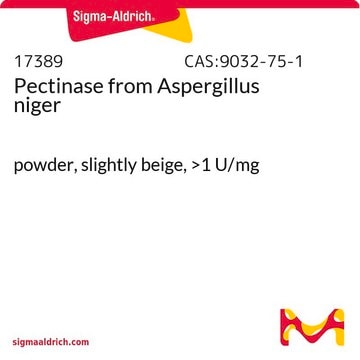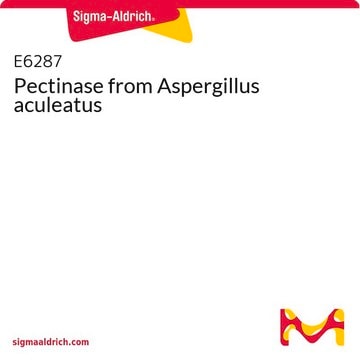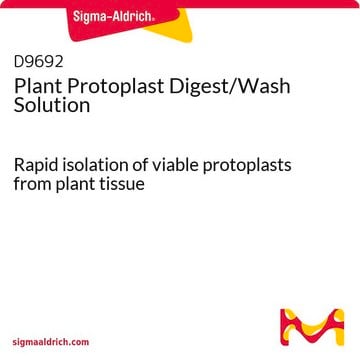P4716
Pectinase from Aspergillus niger
BioReagent, suitable for plant cell culture, aqueous glycerol solution, ≥5 units/mg protein (Lowry)
Synonym(s):
Poly-(1,4-α-D-galacturonide) glycanohydrolase, Polygalacturonase solution from Aspergillus niger
About This Item
Recommended Products
biological source
Aspergillus niger
product line
BioReagent
form
aqueous glycerol solution
specific activity
≥5 units/mg protein (Lowry)
greener alternative product characteristics
Waste Prevention
Design for Energy Efficiency
Learn more about the Principles of Green Chemistry.
sustainability
Greener Alternative Product
technique(s)
cell culture | plant: suitable
greener alternative category
, Enabling
storage temp.
2-8°C
Looking for similar products? Visit Product Comparison Guide
General description
Application
- for protoplasts liberation
- in the protoplast enzyme mixture for enzyme digestion
- to conduct partial saccharification of sugars
- to study their role in the invasion of plant tissues by phytopathogens, the spoilage of produce and various food processing and plant biotechnology applications
Biochem/physiol Actions
Unit Definition
Physical form
Other Notes
Signal Word
Danger
Hazard Statements
Hazard Classifications
Resp. Sens. 1
Storage Class Code
10 - Combustible liquids
WGK
WGK 3
Flash Point(F)
Not applicable
Flash Point(C)
Not applicable
Personal Protective Equipment
Certificates of Analysis (COA)
Search for Certificates of Analysis (COA) by entering the products Lot/Batch Number. Lot and Batch Numbers can be found on a product’s label following the words ‘Lot’ or ‘Batch’.
Already Own This Product?
Find documentation for the products that you have recently purchased in the Document Library.
Customers Also Viewed
Protocols
To measure pectinase activity, a titrimetric stop reaction assay is used. One unit of pectinase will liberate 1 μmol of galacturonic acid from poly-galacturonic acid per hour at pH 4.0 at 25 °C.
To measure pectinase activity, a titrimetric stop reaction assay is used. One unit of pectinase will liberate 1 μmol of galacturonic acid from poly-galacturonic acid per hour at pH 4.0 at 25 °C.
To measure pectinase activity, a titrimetric stop reaction assay is used. One unit of pectinase will liberate 1 μmol of galacturonic acid from poly-galacturonic acid per hour at pH 4.0 at 25 °C.
To measure pectinase activity, a titrimetric stop reaction assay is used. One unit of pectinase will liberate 1 μmol of galacturonic acid from poly-galacturonic acid per hour at pH 4.0 at 25 °C.
Our team of scientists has experience in all areas of research including Life Science, Material Science, Chemical Synthesis, Chromatography, Analytical and many others.
Contact Technical Service











